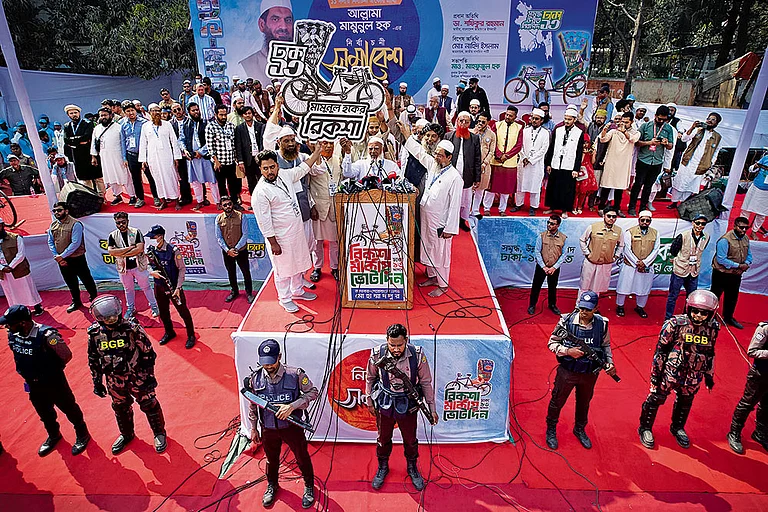From adapting the traditional game of snakes and ladders as a tool to foster awareness in young girls on health issues at Lakhimpur Kheri, Uttar Pradesh, using the allure of a ‘pitara’ for responding to anonymous queries from adolescent girls on menstrual hygiene in Varanasi, to a record-breaking ‘nukkad natak’ marathon at the Kumbh mela on the importance of nutrition… are just some examples of the work that a band of committed young professionals are doing across the country.
Over 300 young Swasth Bharat Preraks are charting a new path -- driven by the passion to make a difference to the lives of people as they quietly go about their work, creating ripples of change.
Innovation is their mantra, backed by their ‘Can do, and Will do’ spirit. Working closely with the local administration and the community at the grassroots level, these Swasth Bharat Preraks are laying the foundations of a healthy India. They are catalysing and deepening the impact of the fight against malnutrition.
Towards A ‘Kuposhan Mukt’ India
Malnutrition is an underlying cause of over 45% of under-5 mortality in the country. India also has a high prevalence of childhood stunting and maternal and childhood anaemia. Evidence suggests that malnutrition can result in potential Gross Domestic Product losses of 2-3% and a more than 10% potential reduction in lifetime earnings for each malnourished individual.
It is against this backdrop that the path-breaking POSHAN Abhiyaan or the National Nutrition Mission assumes great importance.
A joint initiative of the Ministry of Women and Child Development and the Tata Trusts, the Swasth Bharat Prerak Program supplements the POSHAN Abhiyaan by providing managerial and administrative support to the district and state administrations for the effective implementation of the Abhiyaan.
Launched on 8 March, 2018, Poshan Abhiyaan has brought the issue of nutrition centre-stage and energised the movement against malnutrition with a greater sense of purpose and urgency.
Speaking about the role of Tata Trusts, Dr Rajan Sankar, Director of The India Nutrition Initiative (TINI), said that they are guided by the vision of the Chairman, Mr Ratan Tata “To do something in nutrition for children in India and pregnant mothers. Because that would change the mental and physical health of our population in years to come.”
“At Tata Trusts, we are committed to a malnutrition-free India. The Swasth Bharat Prerak is our flagship programme, which is driving change at the grassroots level,” says Dr Sankar.
Contributing To Nation-Building
The Swasth Bharat Prerak programme provides India’s young and committed professionals an opportunity to contribute to nation-building by stimulating change at the grassroots level. “That’s where this initiative is so special, and different. It has a catalyzing resource at the forefront -- the Swasth Bharat Preraks,” says Dr Chandrakant Pandav, Member, National Council on India's Nutrition Challenges.
Among the Preraks are engineers, doctors, management and social sciences graduates. Many have given up cushy corporate sector roles to make a difference to the country’s future.
During the design phase, experts suggested engaging young and bright minds from premier institutions of the country to provide impetus to the programme. Planners also felt that it would offer India’s youth an opportunity to experience the realities of working at the grassroot level in some of the most challenging geographies and diverse cultures.

As a Kishore Vaigyanik Protsahan Yojana scholarship awardee and an aerospace engineer from IIT, Chennai, Vutukuri Koundinya could have gone for a plush career but he opted for what he always wanted -- “Doing something for the society and make a positive impact in the lives of people.”
For Vinay Kumar, his humble roots in a village in Uttar Pradesh kept him grounded and focussed. “Helping others and a burning desire to make an impact in their lives was always my goal even when I was in school.”
Khushbu Maheshwari, Swasth Bharat Prerak in Hamirpur district, Uttar Pradesh, said she has often been a beneficiary of schemes and had always wanted to contribute. “Today as an implementer, I have deep insights into the complex process of development, and understand better the expectations of beneficiaries,” she says.
Driving Change
Coming from diverse backgrounds, what the Preraks have in common is burning intensity to contribute to the country’s well-being. “Their passion is contagious and has rubbed off on to the functionaries across all levels; and there is a perceptible difference on the ground. This portends well for the fight against malnutrition and I am delighted with the outcome,” says Dr Pandav.
As a district-level resource for POSHAN Abhiyaan, Preraks have contributed substantially in moving the agenda forward.
The impact is evident. Between August 2018 and March 2019, convergent action plans across 240 districts have been drafted, as part of the capacity building machinery for the state and district office. They are playing a vital role in capacity building of frontline functionaries. The results are equally impressive for other indicators too.
“The Swasth Bharat Prerak programme has been instrumental in the implementation of POSHAN Abhiyaan so far. What is extremely gratifying is how young professionals have catalysed the movement.” says Dr. Rajesh Kumar, Mission Director POSHAN Abhiyaan, Joint Secretary, Ministry of Woman & Child Development.
Success Is In Coming Together
A key component of the Swasth Bharat Prerak programme is convergence of the whole range of departments at the grassroots level. Armed with a medical and public health degree, Swasth Bharat Prerak Anshuman from Sheikhpura, Bihar, believes that convergence is the mantra for the success of POSHAN Abhiyaan. The targets, he says, can never be achieved by a single person or department. Hence, the need for convergence.
In Gonda district of Uttar Pradesh, Swasth Bharat Prerak Pallavi Gautam brought together major stakeholders on a common platform, called the POSHAN Pakhwada, to create awareness, discuss issues, and plan the way forward with focus on sanitation and the importance of nutrition for adolescent girls.
In Gopalganj, Bihar, Swasth Bharat Prerak Vishal Raghuvanshi has borrowed the concept of a war room from the armed forces to improve participation both of functionaries and beneficiaries in the Village Health Sanitation and Nutrition Day. From the Poshan War Room, reminder calls are made to all frontline functionaries to ensure their participation in the event.
Making Technology Work
An important component of the programme is leveraging technology. For too long have the Anganwadi workers been burdened with paperwork. Maintaining 11 registers, day in and day out, is no easy task. But no more. A smartphone app has come to their rescue.
“A scientifically driven approach to combat malnutrition necessitates the use of technology and mapping progress in real-time,” says Swasth Bharat Prerak Arjun Sharma from Chandauli district in Uttar Pradesh.
Strengthening Systems
Systemic changes have also been brought about. An alert and committed Swasth Bharat Prerak at Buxar district in Bihar, Mayank Joshi has saved the district administration around Rs 90 lakhs over a three month period.
“Resources which could have been utilised to curb malnutrition were going waste,” says Mayank. He presented the evidence to the District Magistrate, which led to an overhaul of the programme.
ISO certification and Anganwadi centres? It does evoke a question mark. Twenty-five Anganwadi centres from 13 different blocks in sprawling Chittoor, the second largest district in Andhra Pradesh, have received International Organisation for Standardisation (ISO) certification.
“It is a recognition of the improved facilities at the Anganwadi centres and helps instil professionalism in day to day operations,” says Kartheek Reddy, Swasth Bharat Prerak from Chittoor district. “It has also encouraged the community to take greater ownership of Anganwadi centres,” he adds.
Diewakarr Anupam Mittal, Swasth Bharat Prerak from Haridwar district, Uttarakhand, was shocked at how an Anganwadi in Anneki village was being treated as a dumping yard. Diewakarr was determined to change this. With support from the district administration and the community, the dilapidated building was transformed into a model Anganwadi centre, a welcoming abode for mothers and children alike.
Making Malnutrition A Jan Andolan
Preraks are working steadily towards realising the vision of nutrition becoming a people’s movement.
“The role of Swasth Bharat Preraks in creating a buzz around the importance of overcoming the challenge of malnutrition and making this a Jan Andolan is particularly credit-worthy,” says Dr. Rajesh Kumar, Mission Director, POSHAN Abhiyaan
Naman Pant, Swasth Bharat Prerak at Prayagraj, Uttar Pradesh, believes strongly that community mobilization is the key to successfully achieving the objectives of POSHAN Abhiyaan. The world’s largest human gathering, the Kumbh Mela, provided the perfect locale and platform to spread awareness about malnutrition and its causes, and bring about behavioural change in the community. A record-breaking 100 ‘nukkad nataks’ (street plays) of 10 minutes each were performed in a 24-hour period.
Morena, 39 km from Gwalior in Madhya Pradesh, once infamous for its association with dacoits is now popular for the power of Five – the Power Panch Girls taking on the mantle of fighting anaemia. Each of these five girls educate another five girl members.
A Gandhi Fellow and an engineer in Biotechnology, Arun Subramanyam chose radio, community radio and television to inform people about nutrition. He has connected more than 18,000 households in the Nilgiri hills through these mediums.
The Path Ahead
Given the solid start and the contribution of the Swasth Bharat Prerak programme towards achieving the goals of POSHAN Abhiyan and the fight against malnutrition, its scope is being expanded and soon bright and committed Preraks will be placed in each of the 719 districts of the country.
“It is gratifying to see the young committing themselves to nation-building and leading the charge against malnutrition,” says Dr Sankar. “However, it would be important to stay the course for the results to show fully,” he adds.
(The Tata Trusts is among India’s oldest, non-sectarian philanthropic organizations supporting a diverse portfolio of development activities.)





















